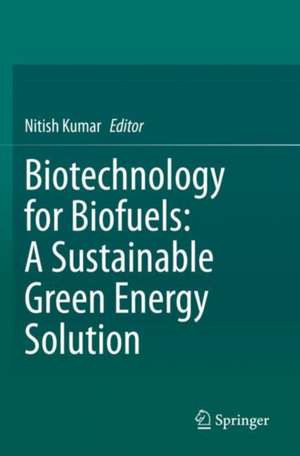Biotechnology for Biofuels: A Sustainable Green Energy Solution
Editat de Nitish Kumaren Limba Engleză Paperback – 17 mai 2021
| Toate formatele și edițiile | Preț | Express |
|---|---|---|
| Paperback (1) | 947.35 lei 3-5 săpt. | |
| Springer Nature Singapore – 17 mai 2021 | 947.35 lei 3-5 săpt. | |
| Hardback (1) | 792.04 lei 38-44 zile | |
| Springer Nature Singapore – 17 mai 2020 | 792.04 lei 38-44 zile |
Preț: 947.35 lei
Preț vechi: 1155.30 lei
-18% Nou
Puncte Express: 1421
Preț estimativ în valută:
181.33€ • 197.03$ • 152.42£
181.33€ • 197.03$ • 152.42£
Carte disponibilă
Livrare economică 31 martie-14 aprilie
Preluare comenzi: 021 569.72.76
Specificații
ISBN-13: 9789811537639
ISBN-10: 9811537631
Pagini: 288
Ilustrații: XI, 288 p. 49 illus., 32 illus. in color.
Dimensiuni: 155 x 235 mm
Greutate: 0.5 kg
Ediția:1st ed. 2020
Editura: Springer Nature Singapore
Colecția Springer
Locul publicării:Singapore, Singapore
ISBN-10: 9811537631
Pagini: 288
Ilustrații: XI, 288 p. 49 illus., 32 illus. in color.
Dimensiuni: 155 x 235 mm
Greutate: 0.5 kg
Ediția:1st ed. 2020
Editura: Springer Nature Singapore
Colecția Springer
Locul publicării:Singapore, Singapore
Cuprins
Chapter 1: Biofuels: perspective for sustainable development and climate change mitigation.- Chapter 2: Nanoparticles for Sustainable Bioenergy and Biofuel Production.- Chapter 3: Bio-hydrogen: technology developments in microbial fuel cells and their future prospects.- Chapter 4: Recent Advances in Genetic Improvement of Jatropha curcas: a potent biodiesel plant.- Chapter 5: Catalytic approach for production of hydrocarbon rich bio-oil from a red seaweed species.- Chapter 6: Seaweed biomass and microbial lipids as a source of biofuel.- Chapter 7: Microbial Biofuels: an economic and eco-friendly approach.- Chapter 8: Biofuels: sources, modern technology developments and views on bioenergy management.- Chapter 9: Integrating omics and microbial biotechnology for the production of Biofuel.- Chapter 10: An Overview on Biomass of Bamboo as a Source of Bioenergy.- Chapter 11: Advances and challenges in sugarcane biofuel development.
Notă biografică
Dr. Nitish Kumar is a Senior Assistant Professor at the Department of Biotechnology, Central University of South Bihar, Gaya, Bihar, India. He received his Master’s Degree in Agricultural Biotechnology from Himachal Pradesh Agricultural University, Palampur in 2003 and his PhD in Botany from Bhavnagar University in 2009. Dr. Kumar is currently a plant biologist with a focus on Plant Tissue Culture, Molecular Marker Development, Transgenic Technology and Microbial Biotechnology. He has published a number of research papers in peer-reviewed journals of national & international repute. In addition, he has received many awards\fellowships from various organizations, e.g. the CSIR, DBT, ICAR and DST. He is an associate editor of the journal GENE.
Textul de pe ultima copertă
The depletion of petroleum-derived fuel and environmental concerns have prompted many millennials to consider biofuels as alternative fuel sources. But completely replacing petroleum-derived fuels with biofuels is currently impossible in terms of production capacity and engine compatibility. Nevertheless, the marginal replacement of diesel with biofuel could delay the depletion of petroleum resources and abate the radical climate change caused by automotive pollutants. Energy security and climate change are the two major driving forces for worldwide biofuel development, and also have the potential to stimulate the agro-industry. The development of biofuels as alternative and renewable sources of energy has become critical in national efforts towards maximum self-reliance, the cornerstone of our energy security strategy. At the same time, the production of biofuels from various types of biomass such as plants, microbes, algae and fungi is now an ecologically viable and sustainable option. This book describes the biotechnological advances in biofuel production from various sources, while also providing essential information on the genetic improvement of biofuel sources at both the conventional and genomic level. These innovations and the corresponding methodologies are explained in detail.
Caracteristici
Reviews the latest developments in the research on a promising biofuel crop – jatropha Discusses the advances in Jatropha cultivation based on biotechnology and breeding tools Assesses the benefits of this biofuel crop and its limitations Addresses the role of microorganisms in biofuel production Discusses nanotechnology and computational biology approaches in biofuel production
